I find this situation very ironic. I have always wanted a strong empress to have a twist in the story, but when I get one I want her dead as soon as possible. She reminds me of Johann David Brecht (?) in many ways. And I did NOT like him...
She reminds me of Johann David Brecht (?) in many ways. And I did NOT like him...
Novum Romanum Imperium -- A Tuscany DW AAR
- Thread starter Avindian
- Start date
-
We have updated our Community Code of Conduct. Please read through the new rules for the forum that are an integral part of Paradox Interactive’s User Agreement.
You are using an out of date browser. It may not display this or other websites correctly.
You should upgrade or use an alternative browser.
You should upgrade or use an alternative browser.
Awesome! The empress must die!!!!!
Patience, my friend.
I find this situation very ironic. I have always wanted a strong empress to have a twist in the story, but when I get one I want her dead as soon as possible.She reminds me of Johann David Brecht (?) in many ways. And I did NOT like him...
When I designed her, my parallel was Catherine the Great. If you read some of her memoirs, she complains about being forced to marry a man she doesn't love, the trials of being eldest child yet not able to inherit the throne, etc.
There might still be time for a strong non-vindictive female character, so don't lose too much hope!
Yet that emperor could be nice...if only he wasn't such a weakling!
Indeed!
Chapter 55, part 2: The truth is revealed
28 September 1746, Picunmapu, South America
Benedetto van Dijk swore under his breath. Politics. It's always damned politics. Why do I need to be in this godforsaken wasteland? As the grandson of a hero, he felt he was entitled to a cushier assignment, but there was no such luck.
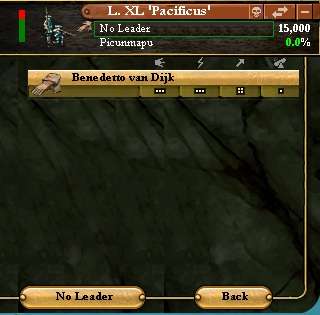
Ever since Emperor John III had returned from the front, things had become much more tense in Rome. Political alliances were changing every day, as the Empress and Emperor clashed over even the least prestigious assignments. Benedetto was a pawn in this game. His promotion to General had been a victory for the Emperor; being exiled to South America was a victory for the Empress. His family had always supported the di Farneses, and Benedetto had made the mistake of continuing the family tradition. One of the jobs in the entire Imperial legions -- the Chief of the General Staff -- remained vacant, and Benedetto intended to do whatever it took to make sure he earned that job. He'd just have to make the best of it.
The Emperor dominated foreign policy, and it showed with brilliant deals that got Salzburg and Bavaria out of the war.


Austria was nearly completely occupied, with only Mecklenburg, some Russian provinces, and a few colonies remaining free. Those in the Pacificus Legion who were concerned with politics -- which was most of them -- were also chattering about an intriguing new officer who'd won the battle that, effectively, ended Austrian resistance.
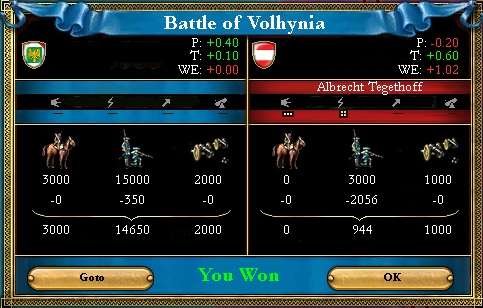
Lucius Vorenus was the scion of a very old Tuscan family. In fact, they proudly called themselves Tuscan rather than Italian or even the increasingly popular Roman. Family legend had it that a Vorenus was at the side of Maso I when the Emperor was assassinated. Yet, despite the considerable age of his pedigree, his family had never been ennobled. A few bachelors had earned minor nobility, but had never achieved enough success to pass it on to other members of the family. Lucius's branch of the family was mostly preoccupied with commerce. Lucius's father was a shipwright and had worked on the Freiburg, the Empire's first threedecker. That meant a close relationship with the former Marshal of the Empire, Constantijn de Ruyter. The Marshal's influence was enough to get 18 year old Lucius an appointment to the Germanicus Academy in Florence, a few blocks from the Vorenus family home.
That had been in 1737. While Lucius possessed every conceivable tactical and physical attribute for success in the legions, he lacked the inclination and skill to understand military strategy at a high level. As Imperial law demanded that no officer could be promoted beyond Captain without attending the Van Dijk College of War, Lucius seemed doomed to toil away in the legions, advancing no farther in the cursus honorum than any of his ancestors. He briefly considered resigning, as his neighbor Filippo Cybo had done, and joining a mercenary company when the war against Austria began.
Captain Vorenus's greatest asset, the family name, was enough to earn him a premier assignment under General Cybo. As Captain, he led the infantry in a charge against Austrian forces at the Battle of Szolnok, a tactic that so stunned the Austrian commander that his men broke and ran. General Cybo, deeply impressed by the young officer, promoted him to Lieutenant Commander on his own authority. For once, the Empress's odd prejudices actually helped a deserving officer, as his promotion went through smoothly thanks to his Italian heritage. The "glass ceiling" shattered, his victory at Volhynia put him on the fast track to make Commander.
Benedetto van Dijk could only groan in frustration. He'd been born in Italy too, had easily passed every test at the Van Dijk College of War, and yet, even as a General, had less respect among his own troops than a mere Lieutenant Commander half his age!
The 54 year old General would have been even more furious had he known the part Lucius was to play just a few days later.
-----------------------------------------------------------------------------------------------------------------------
9 January 1747, Palazzo di Farnese, Rome
Albrecht Tegethoff, Marshal of the Austrian forces, was both humbled and incensed at his presence as Austria's representative in the peace negotiations. The Austrian Emperor had a very... personal history with the Empress of Italy, and only Albrecht had the rank to treat with Emperor John III. Even he knew of the internal struggles that continued between Ulrike von Württemburg and her husband. Albrecht admired John III, as very few monarchs led their forces into battle directly in this modern era, and so he sat politely. Despite the fact that they were a good fifty feet away in an antechamber, he could very clearly hear them.
"Ulrike, I will not discuss this with you again. I do not appreciate your using my legions as an instrument for your own personal vendettas!"
"Johann, that bastard is your son's father! Unless you press this advantage, he will surely try to claim your throne!"
Albrecht heard vigorous laughter after that, followed by the Emperor's response. "I would like to see a man with no army try to claim anything, my dear. I promise, we will take as much as we can from the Austrians, but I categorically refuse to demand the head of your jilted lover. I do not care who biologically created my son, he is legally my heir and I am his father. That is that."
The Austrian Marshal heard footsteps, and in stepped John III, Emperor of Italy, with the Empress noticeably absent. "Marshal Tegethoff, forgive my absence."
Albrecht bowed slightly and inclined his head. "What terms do you offer Austria, Emperor?"
"The Danube is an important source of water and power to my Empire, Marshal. There is also some strategic value in owning some Austrian land in Central America. I am willing to let you keep your lands in Russia, although I do want you to know that I will support my Imperial cousin should he demand them from you."
The Marshal blinked in surprise. "That is very generous, if I may say so. You do not wish to force us into your religion?"
The Emperor shook his head. "The project of the Roman Empire's rebirth is my primary -- no, my only -- concern. If the words of Luther spread to your lands, I will be delighted, but I do not intend to convert by the sword."
"Then on behalf of Austria, I accept your terms."
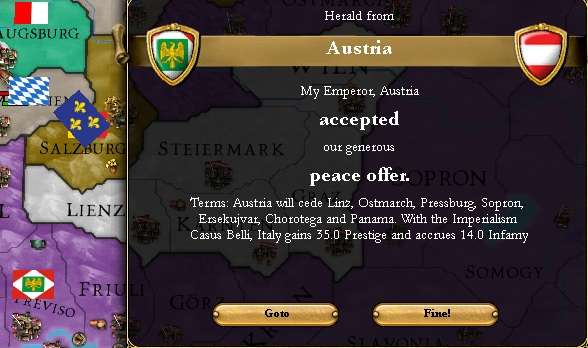
John III gestured to his personal aide, Lieutenant Commander Vorenus. Lucius saluted the Marshal and then presented him with the draft of the treaty. Albrecht smiled.
"You are the architect of the victory at Volhynia, is that right?"
Lucius ever so slightly smiled. "That is what many claim. I am not among them."
The Marshal chuckled. "Humility is good in an officer, Lieutenant Commander, but not if it is overdone."
"Thank you for the advice, sir."
As both the Marshal and Emperor John signed the treaty, Ulrike paced back and forth in the antechamber. Her husband was not as malleable as he first seemed. Thank goodness he did not suspect why she had been so quick to send him into the field. Yes, part of it was so she could avenge herself on Austria. But the real reason was far more brutal.
She had hoped her husband would be killed in the field.
-------------------------------------------------------------------
1 May 1748, Constantinople
One of the oldest Imperial traditions had been the funeral of the Prince in the Prince's city, although nobody had expected the Prince to die so young. A sudden and vicious fever claimed the life of Lodovico di Farnese, the Prince of Constantinople.
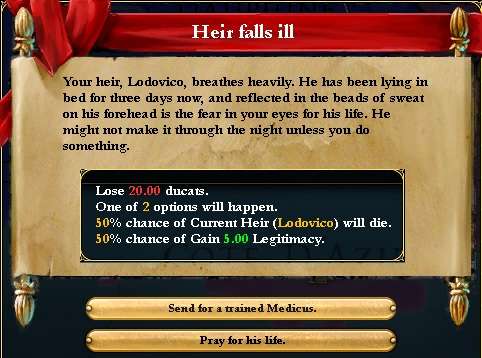
Although Empress Ulrike wept and grieved for her lost son, she was more concerned, it seemed, for the influence she lost. When Niccolo Conti, one of her husband's closest friends and chief advisors, died, she'd successfully gotten Severino Visconti, a man of peace in one of the most warlike families in all of Italy, appointed to his spot in the Imperial Cabinet as Minister of Religious Affairs.

Most of the time, like his father before him, John III was able to ignore the Senate, but when the Senate had pushed so insistently for Visconti's appointment, guided by the unseen hand of his wife, he had decided to grant them a small token of his favor. Although Rodolfo Sfondrati was still nominally Minister of Foreign Affairs, Visconti wormed his way into negotiations with recently defeated Riga and Sweden, inserting clauses demanding conversion in the treaties.
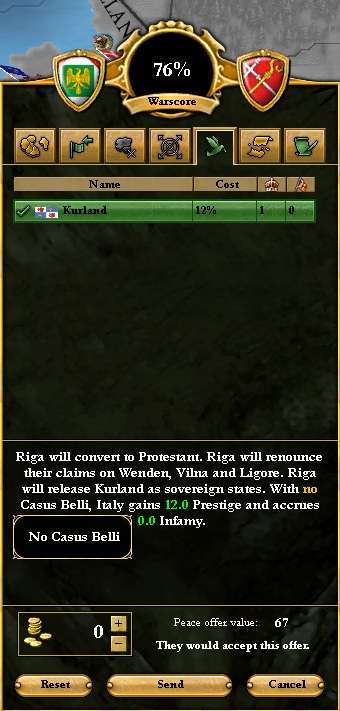
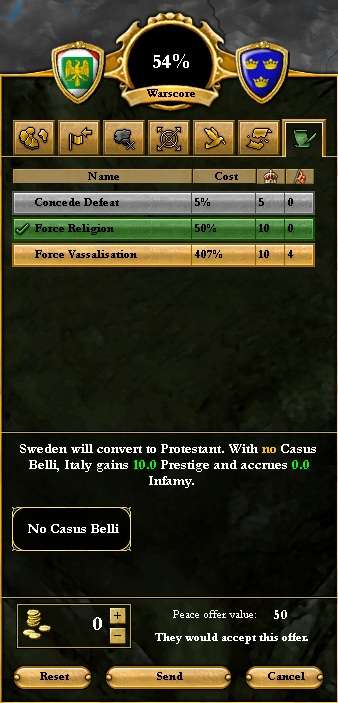
To John, these were not matters of real concern. He was becoming increasingly impressed with now-Commander Vorenus after two more victories against Riga at Livland and Estland.
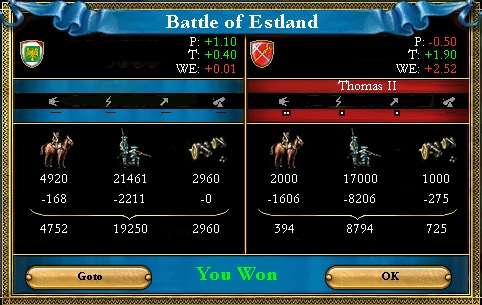
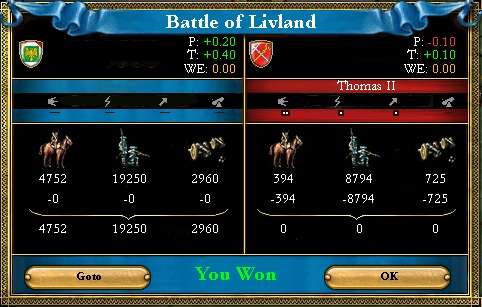
The Emperor won a victory in politics when General van Dijk was given the vacant seat of the Chief of the General Staff. The army was loyal to him, and that meant that no matter what happened in the future, Ulrike would never be able to exercise the nigh-unlimited power she had in the past.
That was all before the loss of his only son and heir. He was far more devastated than his wife, who saw an interesting opportunity.
An opportunity she would not pass up.
-----------------------------------------------------------------------
18 June 1750, Chambers of the Imperial Senate, Rome
Ferdinando Pallavicini, the Deputy Chancellor, gained even more prestige. Unlike Chancellor de Neuchâtel, his boss, Ferdinando supported the Empress in the power struggle. He already had the Cabinet seat his boss craved and would never get, but his international reputation won him an even more important assignment.
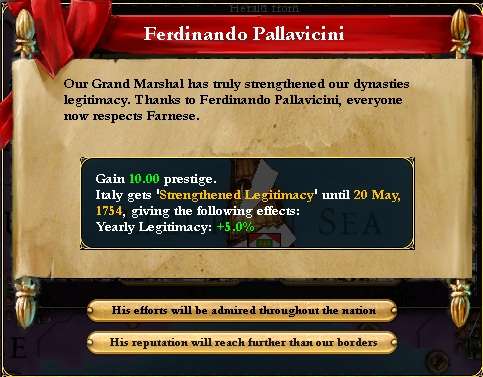
The Empress's moves had been beautiful, and the Deputy Chancellor was her trump card. As the Emperor's hold over the army tightened, Ulrike turned to the one place she did have enough authority: the Senate. While the Emperor seemed to favor untrustworthy foreigners like his Chancellor and his Field Marshal, Empress Ulrike had always relied on Italian-born officials to carry out her instructions. This made her incredibly popular with the Senate. Once the Emperor gave in on a Cabinet appointment, the Empress used Pallavicini's reputation to get him a promotion, in effect: he was named President of the Senate. With a very loyal pawn in place and a vulnerable husband, she made her final play. The Emperor's greatest strengths were in military policy and foreign affairs, as evidenced by his rapid defeat of Corsica. Thanks to the Foreign Minister, Savoy delayed entering the war just long enough that Russia had to honor her obligation to Italy.
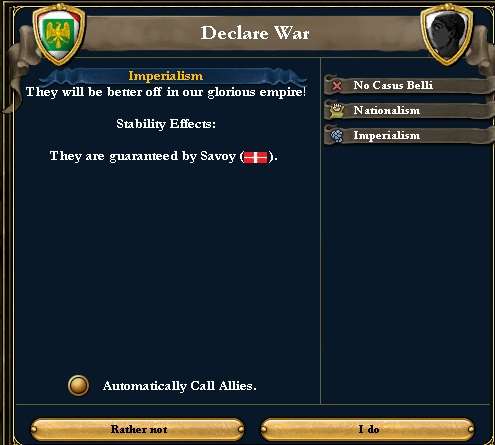
With Corsica annexed, Savoy found herself virtually alone against the Empire, and she soon lost her last European possession and the Canary Islands.
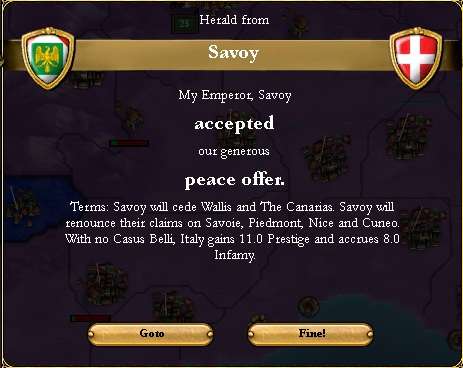
But before Savoy fell, Ulrike delivered the one thing the Empire needed more than anything: an heir.
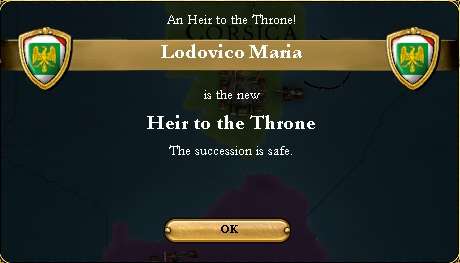
Lodovico Maria -- most often called Marius, to prevent confusion with the former heir and to honor John III's obsession with all things military -- was born on 29 April 1749. The following day, Ulrike influenced her husband to pass one of the most important decrees in the history of the Empire of Italy, commonly called the "Senatorial Assistance Act".
To ensure that I, John III, Emperor of Italy, have the time I need to devote to reconstructing the Roman Empire, I am hereby granting the Imperial Senate power over all matters domestic, under the leadership of the President of the Senate. I decree that this power shall remain inviolable and in perpetuity, until such time as the Senate itself sets this burden down. I and my heirs remain the final arbiter of what is best for Italy as a whole, and may overrule any law passed by the Senate, provided I do so within a month of the law's passage by the Senate.
The Empress smiled in triumph. She'd already prepared Pallavicini to order the passage of an immensely popular law, called the "Freedom of the Citizens of Italy Act."
The Imperial Senate, having been granted the right in intervene in all manners domestic, passes the following items into law:
1. The cursus honorum and all noble ranks are hereby disbanded immediately for all non-military personnel. All hereditary nobility as of this day are now Senators.
2. Additional Senators may only be appointed and dismissed by the President of the Senate.
3. All Senators are granted a permanent income from the state treasury and may pass their office down to any suitable male heir.
4. The Senate shall administer all levels of Imperial government above the regio.
5. All levels of Imperial government below the regio shall be elected by an assembly of all adult male citizens who own sufficient property.
6. All Cabinet-level personnel not serving in the military must be approved by the Senate.
By carefully avoiding the military, Ulrike knew the Emperor would probably not look too closely at the new law, but its implications were immense and far-reaching. Through bureaucracy, she effectively removed the Emperor's right to intervene at all in domestic affairs. The Proconsuls were gone, now mere Senators. That meant if the Emperor wanted to decree something domestically, he would have to rely on reports from the Senate instead of a handful of men who might be personally loyal to him. The army remained potent, and would still be virtually unchallenged as the source of the Empire's prestige and legitimacy, but the Senate was now, effectively, a counterbalance. Even the Imperial Cabinet would be affected by the Senate. Ulrike could never truly affect a coup d'etat, but she had lain the groundwork for a strong Senate to exercise considerable control over a weak Emperor.
That only left one step: finding that weak Emperor.
-----------------------------------------------------------------------------------------------------------------------------
30 August 1752, Palazzo di Farnese, Rome
Ulrike von Württemburg grinned, but only behind her handkerchief, as her husband's body made its way towards the di Farnese family crypt.
The final acts of John III, defeating and annexing Montenegro and Albania, increased the Empire's power, true, and even supported the preeminence of the army, but his victories were fleeting. When he died at the surprisingly young age of 22, she was named sole Regent. Some army officers were incredibly suspicious about the circumstances; unfortunately for them, murder investigations were a domestic matter, and thus under the purview of the Senate. The lack of imperium did spoil her plans somewhat, as she could not declare war upon Württemburg, but her son could, and without a strong male figure like her late husband, he would naturally drift towards his mother. Her victory was almost assured.
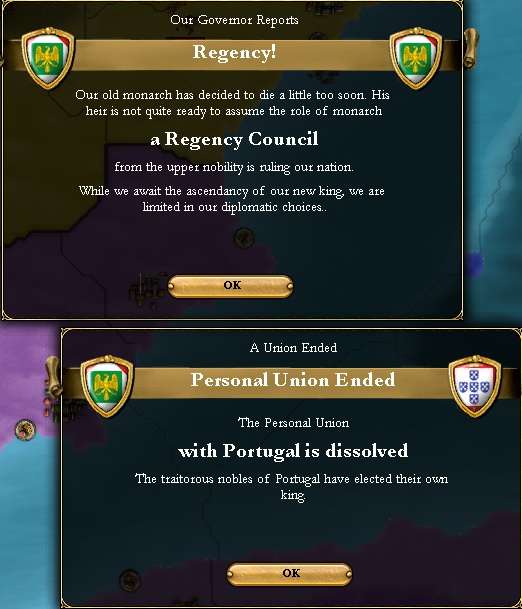
The only seeming failure was the dissolution of the personal union with Portugal, but she used that to her advantage as well, bringing foreign policy under the direction of the Senate as well with another well-timed decree. Sfondrati, the consummate diplomat, continued to serve as Foreign Minister.
She was on top of the world. The poor German princess who couldn't inherit a measly two province kingdom was now the most powerful person on planet Earth, with the mightiest army, the strongest fleet, and an unstoppable coalition behind her. She could do what she wanted, when she wanted, to whom she wanted, and nobody could so much as slow her down. As long as she at least acknowledged the Imperial dream -- and it was one that appealed to her as well -- nobody would question her. She finally had the thing she wanted most, what she craved her entire life. Nearly unlimited power. And if she acted correctly and swiftly, she could indoctrinate her son with her own values, elevating her still higher.
She would become, in essence, a goddess.
---------------------------------------------------------------------
If you guys didn't like her before, I hate to think what you think of her now!
Comments, as always, are welcome!
ach, I like her ... . So signs of Imperial Rome v1 re-emerging, an Imperial authority essentially dependent on the army not civil administration, Germans taking senior roles and of course domestic scheming on an industrial scale. Go Ulrike ... its always good to see someone standing up for tradition!
God I should have gone with the Assassin instead of a nice soldier.
Well atleast there is a real Italian heir on the throne, thats something I suppose.
I still hope she dies soon!
Well atleast there is a real Italian heir on the throne, thats something I suppose.
I still hope she dies soon!
I still think she is a bitch, but I gained a bit respect for her.:glare:
ach, I like her ... . So signs of Imperial Rome v1 re-emerging, an Imperial authority essentially dependent on the army not civil administration, Germans taking senior roles and of course domestic scheming on an industrial scale. Go Ulrike ... its always good to see someone standing up for tradition!
God I should have gone with the Assassin instead of a nice soldier.
Well atleast there is a real Italian heir on the throne, thats something I suppose.
I still hope she dies soon!
She is cold as stone. I hope she goes mad with grief at the end of her life..
Still lots of controversy about our beloved (?) Empress! Excellent! ::cackles maniacally::
Heyo! First post on the forum, I think, but I've been following this AAR for ages (absolutely amazing, by the way). I had to pitch in to say I actually think Ulrike's pretty badass. Her desire to have the Austrian emperor killed was a bit extreme, but otherwise I think she's just a bad bitch (in a good way) who knows what she wants and how to get it. I say long live the Empress!
Heyo! First post on the forum, I think, but I've been following this AAR for ages (absolutely amazing, by the way). I had to pitch in to say I actually think Ulrike's pretty badass. Her desire to have the Austrian emperor killed was a bit extreme, but otherwise I think she's just a bad bitch (in a good way) who knows what she wants and how to get it. I say long live the Empress!
Thanks very much for the kind words, and welcome to the forums! I'm developing a soft spot of my own for Ulrike, I must admit.
You guys are growing weak! We brave Romans cannot have a Damned German Anything on our throne! Man up!
Silly Germans
Silly Germans
*Loads sniper rifle with explosive rounds* That b***h queen is going to die! How dare she kill my most favorite emperor!
Now the shit is serious...
*grabs an M14*
I seriously hope she dies...slowly of course! with wounds over the entire body and all that, oh, get some wooden stakes as well!
Now we have a corrupt senate, a stupid greedy german empress and a weak heir? Only hope is the military now...
*grabs an M14*
I seriously hope she dies...slowly of course! with wounds over the entire body and all that, oh, get some wooden stakes as well!
Now we have a corrupt senate, a stupid greedy german empress and a weak heir? Only hope is the military now...
I have to say, the stage may now be set for a military coup or possibly a civil war. Ulrike really is kind of setting herself up for some trouble. A power struggle between the Senate and the Army can only end badly for the empire and most likely for her as well.
You guys are growing weak! We brave Romans cannot have a Damned German Anything on our throne! Man up!
Silly Germans
*Loads sniper rifle with explosive rounds* That b***h queen is going to die! How dare she kill my most favorite emperor!
Now the shit is serious...
*grabs an M14*
I seriously hope she dies...slowly of course! with wounds over the entire body and all that, oh, get some wooden stakes as well!
Now we have a corrupt senate, a stupid greedy german empress and a weak heir? Only hope is the military now...
I can't believe it -- I've found a figure more polarizing than Peter! You do realize this means I have to keep her around so you all keep reading, right? ::evil grin::
I have to say, the stage may now be set for a military coup or possibly a civil war. Ulrike really is kind of setting herself up for some trouble. A power struggle between the Senate and the Army can only end badly for the empire and most likely for her as well.
I can neither confirm nor deny your suspicions.
mmhh .., enthusiastic response pro/anti to a character is great, but some of the language is getting rather misogynistic, so can everyone keep the language polite
Chapter 56: The memoirs of a hero
15 February 20xx, Van Dijk College of War, Florence
Stefano Vorenus was frustrated, although he knew he shouldn't be. He was in desperate need of an excellent primary source on the Empire in the 18th century so he could finish his paper. His last name had been good enough for smooth sailing through the Germanicus Academy and he'd done well enough in the field. His career would probably never reach General, but he was perfectly fine with that. His goal, from the day he was born it seemed like, was to command an Imperial Legion, and very few Commanders had ever attained the rank without graduating from the Van Dijk College of War. Stefano knew that military history was a key part of that position, as the lessons of the past could provide key hints for the future. The young office just didn't like to read. He'd put the paper off for weeks, but it was due in three days, and he had to finish it soon.
The college's head librarian had pointed him to this section. Stefano scanned the book titles. There were a number of dry sounding books in this section, from Lafayette's The Key to Success in the Modern Army to Brutus Contadino's superb biography of his father. What Stefano needed, however, was something on the legion's modernization in the 1750s and 1760s. Just as he'd given up hope, he saw a curious volume with no title page wedged between two other books. He grabbed the book, and was pleasantly surprised by the title page: The Tales of an Old Tuscan Soldier by Lucius Vorenus. Stefano eagerly began flipping through the pages; this was a book by his illustrious ancestor!
Chapter 10: My first big break
I was appointed Deputy Chief of the General Staff in early 1757. Since my victory at the Battle of Livland, I'd been appointed to head prestigious military missions to Russia, serving in brief wars against Tibet and Manchu. I can't help but wonder if I might have made Colonel much earlier if not for that crack about President Pallavicini. Oh well. If he wanted to be treated like a man, he should have acted like one. The Russian Tsar must have passed along a few good words, or I'd probably still be a Commander as I write this book in 1780. General van Dijk was a great boss, most of the time. He was a bit old and stodgy, but I liked him anyway.
1757 was a momentous year for world politics as well. Brazil, a country in Western Africa, declared its independence from Sweden. That was the first of many newly independent countries in the 1750s and 1760s. The Empire was affected by this, but later on. Our domestic politics were surprisingly stable, even with the Senate constantly interfering. Our Swiss provinces were recognized as sovereign Italian territory, as well as some of our provinces in Nova Italia.
My own task, at least at the time, was to research some new weapons system for our legions. With no Emperor, we knew aggressive war was not a possibility. The Empress was eager for additional conquests, particularly the subjugation of Württemburg, but luckily Marshal Contadino talked her out of it.
Stefano scribbled a few notes; he knew he'd found a great book for his paper. He marked his place, took the book to the checkout desk, and headed back to the barracks where he could relax. After a couple of sandwiches, he picked up the book again and skipped to the next chapter.
Chapter 11: My promotion
The first breakthrough I uncovered was in cavalry weapons. With the superior marksmanship of our infantry and the relatively minor role cavalry had, I decided to emphasize shock rather than firepower, and the results were very impressive.
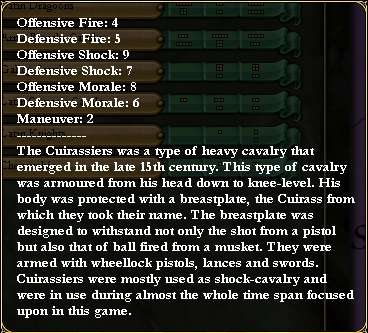
The new cuirasses were developed by some of the more brilliant minds assigned to my group; the so-called Scientific Revolution was paying large dividends already.

I have to give a little credit to that spineless worm Pallavicini. Empress Ulrike was against some of the new ideas coming from these scholars, but the President of the Senate actually had the guts to point out that she could not interfere in domestic affairs according to her own decree! Oh, that was a great day for politics. Not so much for good old Ferdinando, though. The Empress never trusted him after that, and the coalition she worked so hard to build was slowly fracturing. At the end of 1759, though, she won a major victory of her own, as Foreign Minister Sfondrati successfully convinced the King of Transylvania to accept integration into the Empire.
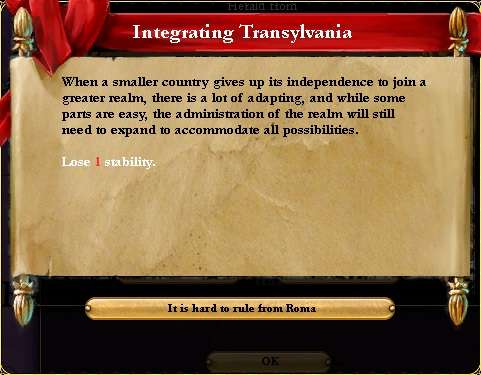
Now, to future generations, this might not seem so important, but it gave us control over the entire Danube east of Vienna. That gave us a very stable frontier, allowing us to deal more with problems in the west, as the time came. It also got me my second major breakthrough, as a Transylvanian metallurgist helped me figure out to lighten our artillery barrels to the point where they could move much more quickly.
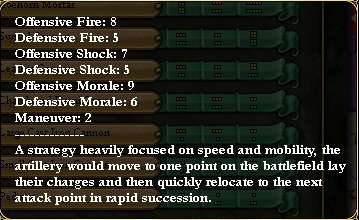
Stefano, who was growing tired, hurriedly flipped through the Italo-Mexican War, which he'd already studied.
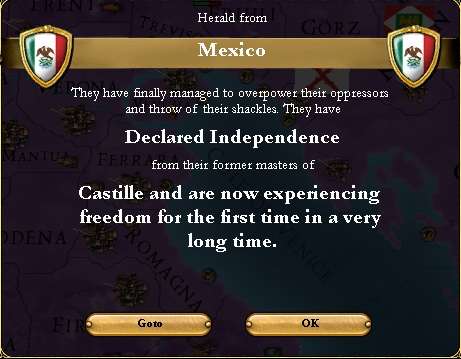
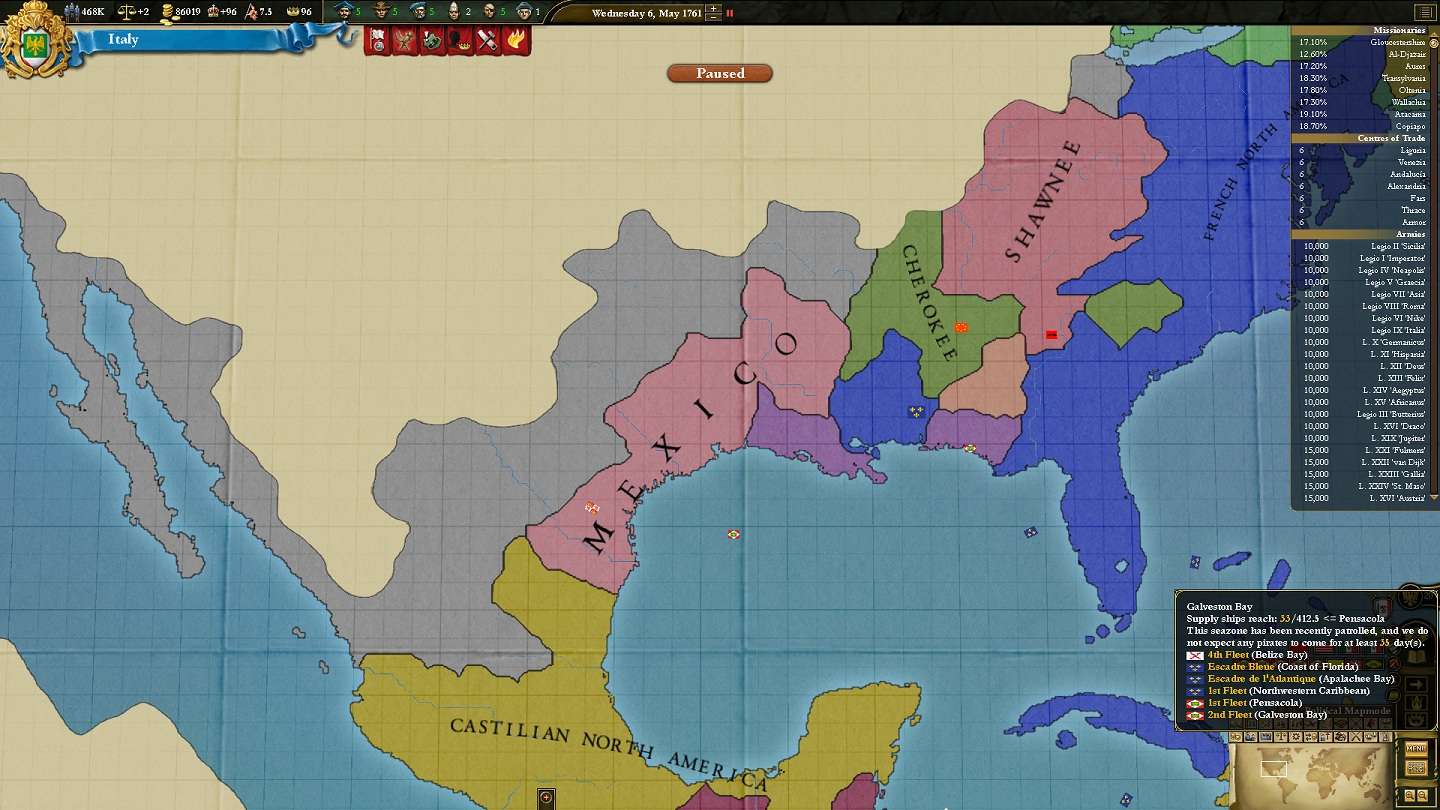
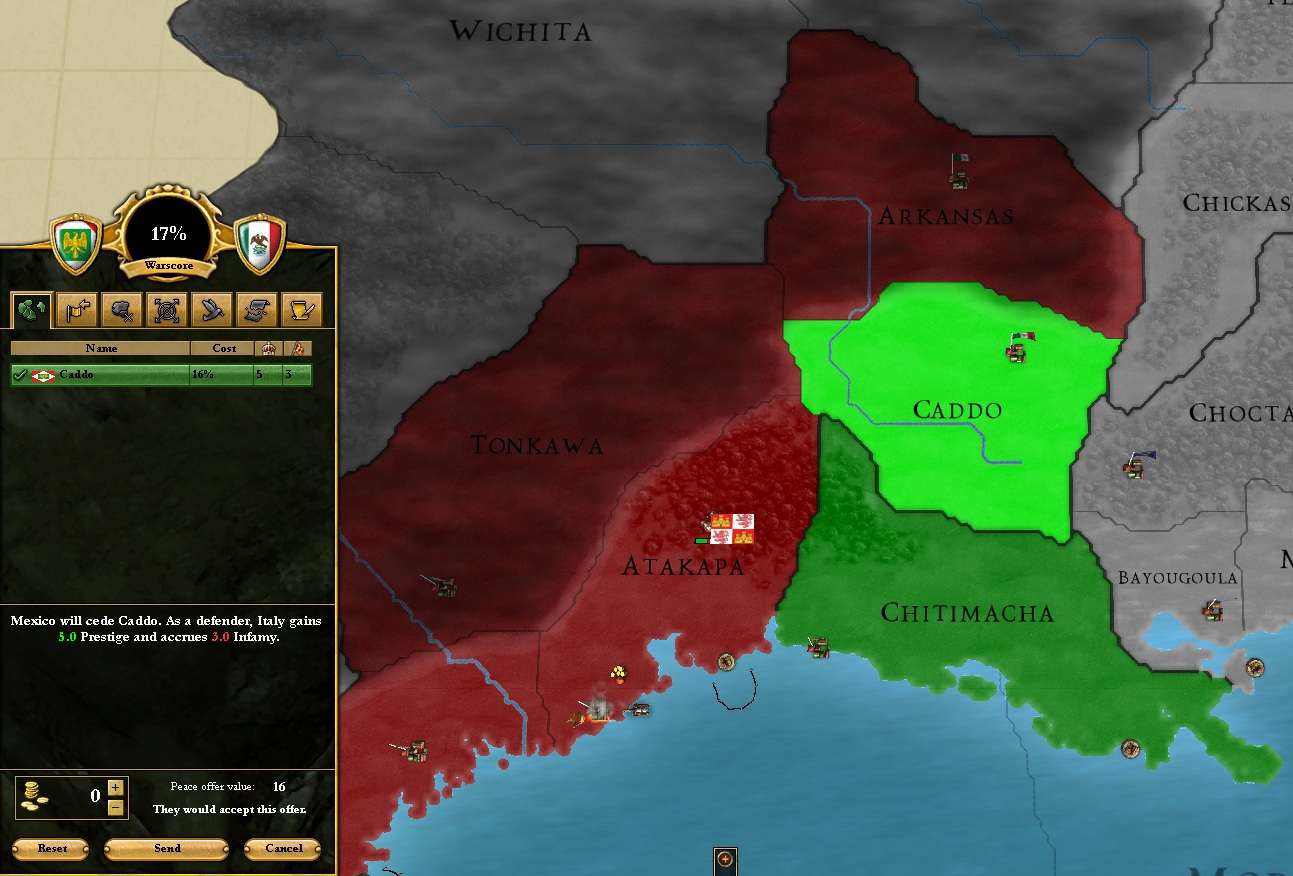
Centurion Vorenus did find something interesting; he'd always wondered why Atakapa, which had become an important Center of Trade, was never acquired in the peace deal, despite the international recognition of Italian sovereignty. The map clearly indicated that Atakapa was the Mexican capital; that made a lot of sense. Between Mexico and Venezuela, which occupied the northern coast of South America, Castille was struck quite a blow. Stefano supposed that was why Castille was Marius I's first target as Emperor, which also made good sense. Stefano snapped his fingers. "Marius I! There's still one more thing I need information on. Let me check the index."
He found an entry on "promotions" and got what he was looking for.
One of the most pleasant surprises I've ever had was the day Senator Cosimo Germanicus proposed that bill on mandatory training. He even closed down the Imperial Bank of Italy to fund it, which, in my opinion, had been worthless for quite a long time.
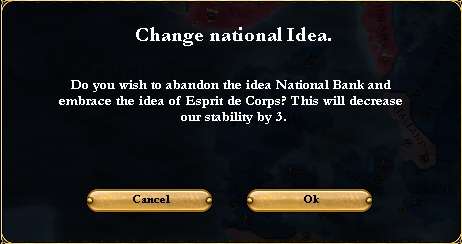
That day in May 1762 was great for both of us; his bill earned him the job he'd been after for a long time, the Foreign Ministry.
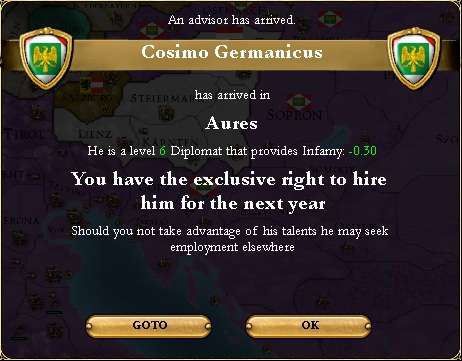
He was a really fantastic one, too, although not nearly as excellent as the new Chief of the General Staff, yours truly. General van Dijk turned out not to be such a bad guy, in the end. He retired and recommended me for the position, right away. Even the Empress didn't give me much trouble, which was kind of shocking. I guess she thought I was one of her pet generals. We had many an argument over the years, but I think she respected me, and I came to grudgingly respect her. She was even polite and courteous at Marshal de Ruyter's funeral. Since she'd ruined his career, I considered that awfully nice of her.
By 1764, she'd changed a bit. We won a war against Galicia, which normally would have made her happy. Catalunya still sends the occasional protest today, demanding that we free their "brothers." That's rich, since they called us into the war in the first place!
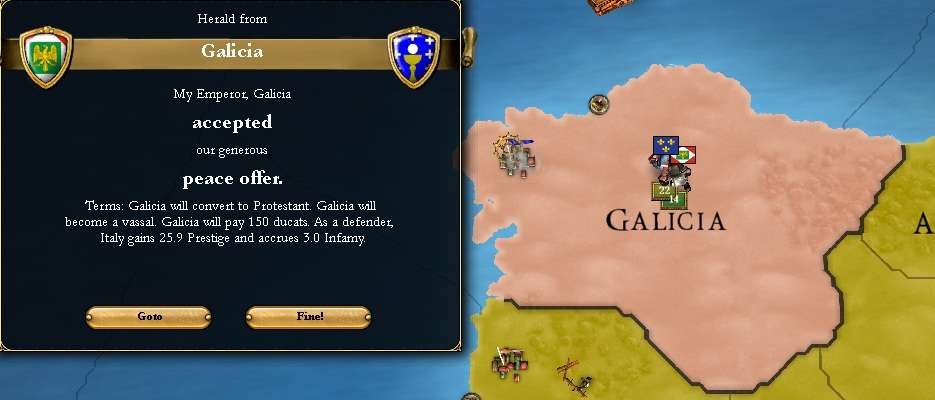
However, she also had to put up with an unbearable loss: her homeland was annexed by Bavaria in February of that year.

She knew we couldn't go after it, that Bavaria was outside of our acceptable action area. There was too much work to be done to restore the Empire to Castille and Northern Europe. Then again, she could also have been biding her time. Her son became Emperor On 1 May 1764, but everyone knew she was the real power behind the throne. Marius really didn't have that much courage to stand up to her; it was the army and, surprisingly, the Senate that would keep her in check.
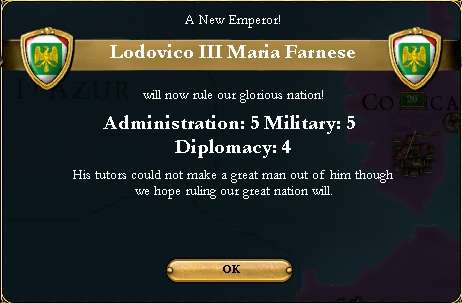
Stefano closed the book. It wasn't everything he needed, but he had gotten a lot of useful material and some great places to look for more. He also got an encouraging e-mail -- his professor had given everyone a one week extension, as he was called away on an emergency. Although Stefano hoped his professor was okay, he was still relieved and planned to put his time to good use.
-----------------------------------------------------------------------------------------------
I'm now caught up to where I stopped playing; I'm going to try to finish the game this weekend.
I've also officially decided that, win, lose, or draw, I'm not going to convert this to Vicky 2. I should get very close to meeting all of my goals, if not exceeding them, and I really don't see much point in continuing past 1821 in any case. I (probably) won't start another AAR either, at least right away, until Descent is finished too.
Don't be too worried; I'll have plenty of updates left, so there's more to come!

